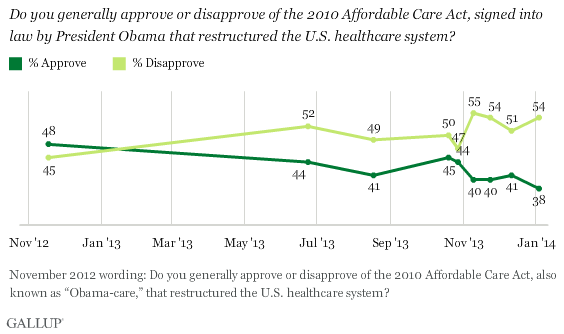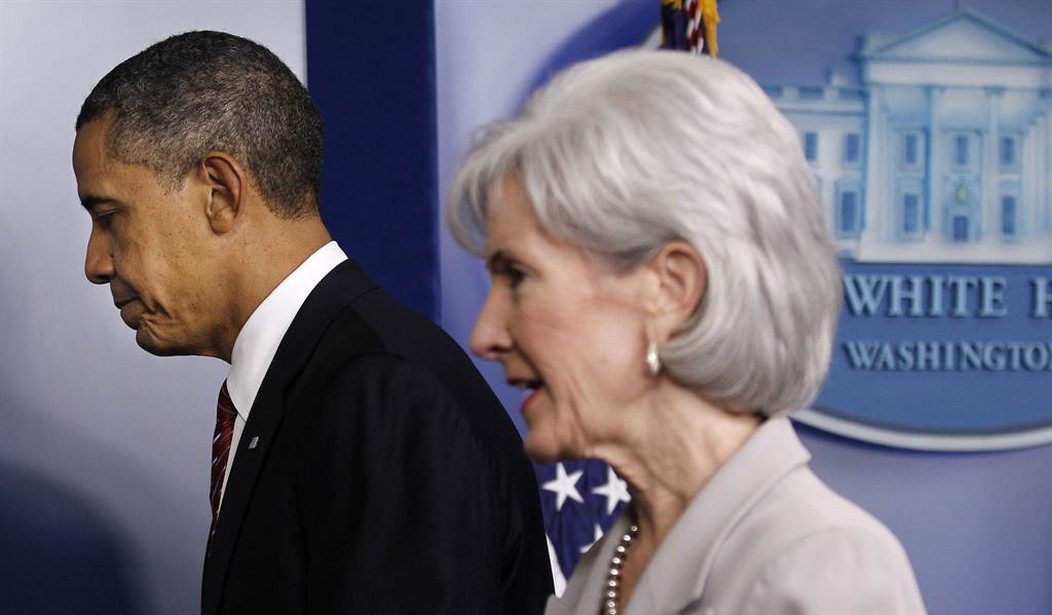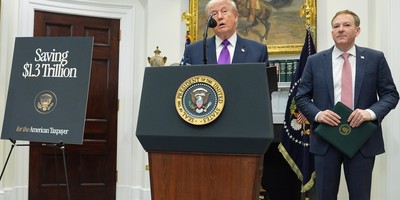Convincing throngs of young and healthy people to overpay for coverage in order to subsidize aging, sicker Americans was always going to be one of Obamacare advocates' toughest tasks. In assessing the composition of healthy, sustainable risk pools, the administration pegged its target percentage of "young invincibles" at just shy of 40 percent. Coming up short of that goal would risk an adverse selection "death spiral" -- or a politically radioactive bailout. The White House has been unusually tight-lipped about how the nationwide numbers are shaping up, and now we know why. Uh oh:
Just 24 percent of Americans signing up for coverage under President Obama's health care law through December were part of the young adult demographic, the Department of Health and Human Services announced Monday -- well below the nearly 39 percent the White House had once deemed essential to the law's success. In a new report, HHS said that through Dec. 28 (about halfway through the six-month open enrollment period), roughly 2.2 million Americans signed up for coverage on one of the law's health insurance exchanges. That's well below the administration's target of 3.3 million. And HHS still hasn't disclosed how many of those who have signed up for insurance have actually paid their first premiums, which is necessary for enrollment to be finalized...in the report, HHS said that just 24 percent of those who signed up so far were aged 18 to 34. In December, a report from the Kaiser Family Foundation identified a “worst-case scenario” situation in which just 25 percent of enrollees were in the 18-to-34 demographic.
Twenty-four percent is below the "worst case scenario" outside analysts had previously envisioned. If insufficient numbers of young Americans enroll in Obamacare's exchanges, insurers will be stuck with sicker, costlier risk pools. They'll compensate for projected losses by jacking up rates on other customers, which could send additional comparatively healthy consumers heading for the exits. To forestall this crumble, the administration may tee up taxpayer-funded bailouts for insurance companies. They could expand a provision within the law that was designed to offer targeted, small-scale bailouts if specific companies ended up getting caught with the short end of the adverse selection stick in certain markets. Republicans are seeking to block this bailout scheme, and I can't imagine the public is too excited about Democrats sending millions or billions to insurers because their trillion-dollar program has been a technological and demographic bust. The New York Times published a story over the weekend describing how the number of coverage misfires is growing. As we've predicted, people are showing up for care only to discover that their insurance company can't confirm that they're covered. Some people are being given the choice of either paying exorbitant out-of-pocket fees or walking away without being treated:
Recommended
Paul D. Donahue and his wife, Angela, are among more than a million Americans who have signed up for health coverage through the federal insurance exchange. Mr. Donahue has a card in his wallet from his insurer to prove it. But when he tried to use it to get a flu shot and fill prescriptions this week, local pharmacies could not confirm his coverage, so he left without his medications. Similar problems are occurring daily in doctors’ offices and drugstores around the country as consumers try to use insurance coverage that took effect on Jan. 1 under the Affordable Care Act...In Los Angeles, Hilary Danailova, who is almost eight months pregnant, said she had to pay $630 for an ultrasound on Thursday after failing to get an ID card or any confirmation of coverage from her new insurer, Anthem Blue Cross. Ms. Danailova, 38, said she signed up just before Christmas and sent her first month’s premium of $410 by overnight mail on Jan. 3. She has repeatedly tried to reach Anthem to see whether the company has processed her payment. “At this point I am facing the cold dread of not knowing whether Anthem ever recorded my enrollment at all,” she said.
In each of these cases, the individuals in question actually tried to pay their first premium. They were informed and responsible, yet still got screwed. How many "enrollees" haven't even attempted an initial payment? The administration won't say. I discussed this issue with Fox News' Gretchen Carlson yesterday:
This is what horrific mismanagement, technological incompetence, and a litany of seat-of-your-pants delays have wrought. Flailing Democrats are trying to pin all of this on the private companies, but Americans understand who the culprit for the chaos truly is. Meanwhile, the Washington Post wakes up to the fact that another barrage of "disruptions" is likely to crash ashore in late 2014, which is precisely what we've been warning about for some time:
When millions of health-insurance plans were canceled last fall, the Obama administration tried to be reassuring, saying the terminations affected only the small minority of Americans who bought individual policies. But according to industry analysts, insurers and state regulators, the disruption will be far greater, potentially affecting millions of people who receive insurance through small employers by the end of 2014. While some cancellation notices already have gone out, insurers say the bulk of the letters will be sent in October, shortly before the next open-enrollment period begins.
And right before the midterm elections. Ahem. I'll leave you with this:


























Join the conversation as a VIP Member